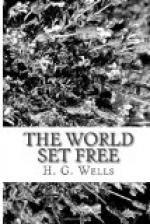‘We want to know has the plaintiff added anything to this or hasn’t he?’ said the judge, ’we don’t want to have your views whether Sir Philip Dass’s improvements were merely superficial adaptations or whether they were implicit in your paper. No doubt—after the manner of inventors—you think most things that were ever likely to be discovered are implicit in your papers. No doubt also you think too that most subsequent additions and modifications are merely superficial. Inventors have a way of thinking that. The law isn’t concerned with that sort of thing. The law has nothing to do with the vanity of inventors. The law is concerned with the question whether these patent rights have the novelty the plantiff claims for them. What that admission may or may not stop, and all these other things you are saying in your overflowing zeal to answer more than the questions addressed to you—none of these things have anything whatever to do with the case in hand. It is a matter of constant astonishment to me in this court to see how you scientific men, with all your extraordinary claims to precision and veracity, wander and wander so soon as you get into the witness-box. I know no more unsatisfactory class of witness. The plain and simple question is, has Sir Philip Dass made any real addition to existing knowledge and methods in this matter or has he not? We don’t want to know whether they were large or small additions nor what the consequences of your admission may be. That you will leave to us.’
Holsten was silent.
‘Surely?’ said the judge, almost pityingly.
‘No, he hasn’t,’ said Holsten, perceiving that for once in his life he must disregard infinitesimals.
‘Ah!’ said the judge, ’now why couldn’t you say that when counsel put the question? . . .’
An entry in Holsten’s diary-autobiography, dated five days later, runs: ’Still amazed. The law is the most dangerous thing in this country. It is hundreds of years old. It hasn’t an idea. The oldest of old bottles and this new wine, the most explosive wine. Something will overtake them.’
Section 4
There was a certain truth in Holsten’s assertion that the law was ‘hundreds of years old.’ It was, in relation to current thought and widely accepted ideas, an archaic thing. While almost all the material and methods of life had been changing rapidly and were now changing still more rapidly, the law-courts and the legislatures of the world were struggling desperately to meet modern demands with devices and procedures, conceptions of rights and property and authority and obligation that dated from the rude compromises of relatively barbaric times. The horse-hair wigs and antic dresses of the British judges, their musty courts and overbearing manners, were indeed only the outward and visible intimations of profounder anachronisms. The legal and political organisation of the earth in the middle twentieth century was indeed everywhere like a complicated garment, outworn yet strong, that now fettered the governing body that once it had protected.




